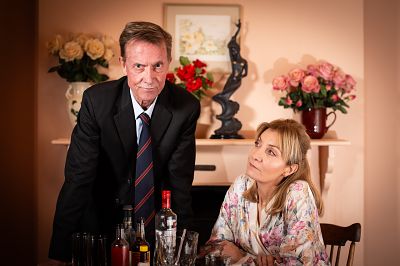
Hansard
Click here if you liked this article 5 ![]()
https://www.stirlingplayers.org.au/
Date Reviewed: 12/09/2025
From the moment of arrival, greeted with a lovely glass of sherry and the warm welcome of front-of-house staff; this was an enjoyable and thought-provoking theatrical experience.
Anita Zamberlan Canala and Andrew Clark deliver outstanding performances as Diane and Robin Hesketh. Robin, a Tory cabinet minister in Margaret Thatcher’s government, returns each weekend to the couple’s country home, where Diane, his stay-at-home wife, resides in quiet discontent. This particular Saturday morning finds her still in her dressing gown, weary of life and wondering out loud about suitable ways to depart it. She is particularly aggrieved by Robin’s part in the passing of Section 28 of the Local Government Act.
The Heskeths’ political ideologies are not aligned, and seemingly never have been, and their ongoing battle with a fox destroying their back lawn is cleverly entwined with their political differences and the broader political tensions of 1988, providing ample opportunities for mixed messages and dry wit.
Their exchanges are sharp and sarcastic yet always cloaked in a distinctly British civility—more restrained than the raw venom of Who’s Afraid of Virginia Woolf, to which Hansard has been compared.
Though their relationship is clearly strained, it’s evident that it wasn’t always so. Tender recollections of happier times surface amid the barbs. Diane, once Robin’s mistress, suspects a new Wednesday-night affair, while Robin bristles at Diane’s drinking, her forgetting of his birthday, and her failure to prepare lunch for their expected guests.
Diane’s search for an old home movie and her reading from their son’s journal poignantly reflect the play’s title, Hansard, suggesting a personal record of family history and emotional truths.
Only late in the play does a darker, more devastating truth emerge, casting a long shadow over their lives and relationship.
The production runs without an interval, and both Anita and Andrew remain on stage throughout. Their emotional precision and command of the material are impressive, with only the rarest of stumbles, swiftly recovered.
The set, a comfortable country home, is beautifully detailed, from the potted red geranium to the fresh celery and lemons awaiting the mixing of Bloody Marys. A stack of jigsaw puzzles quietly hints at Diane’s isolation and idle hours. Lighting and sound are used sparingly but effectively.
It is somewhat disconcerting to watch the pain of a relationship play out as in this production. Sally Putnam’s sensitive direction allows us to reflect upon how our choices—both deliberate and instinctive—can reverberate through our lives and the lives of those closest to us. In the end, despite the sorrow, there will be a birthday lunch with a beautifully decorated cake—a hint of happiness and new beginnings amid the despair.
Reviewed by Deb Secombe